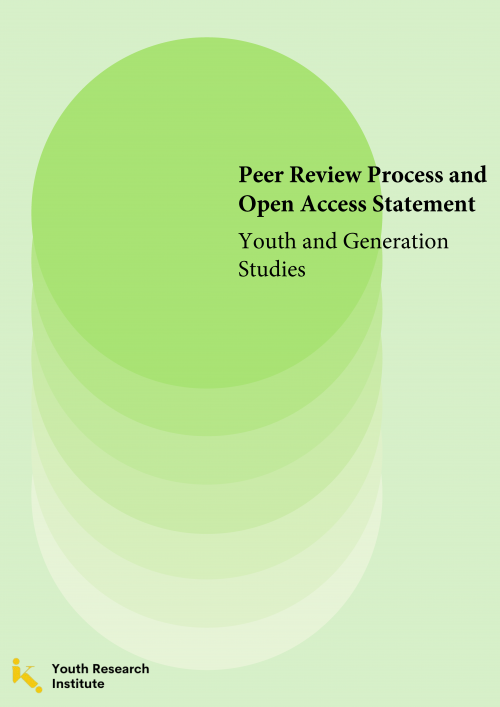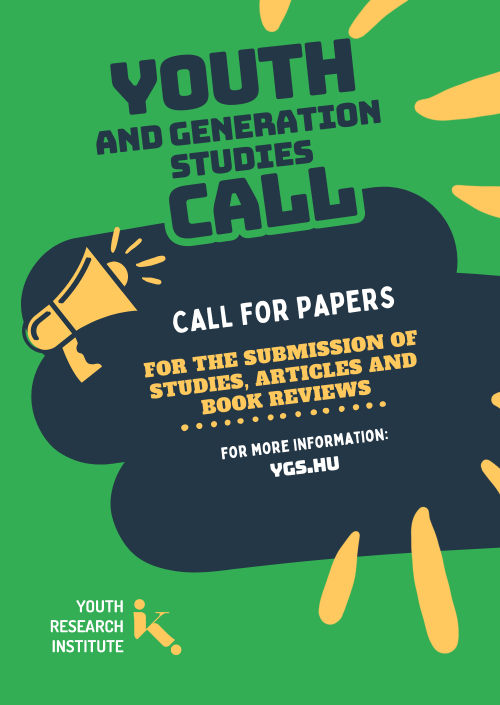Publication Ethics and Malpractice Statement for Youth and Generation Studies (YGS)
This statement is based on the Committee on Publication Ethics (COPE) Best Practice Guidelines for Journal Editors and aims to uphold the highest ethical standards in publishing.
I. Editor Responsibilities
1. Publication Decisions and Accountability
The Editors-in-Chief (EiCs) are responsible for deciding which manuscripts are accepted for publication. Decisions are based on the manuscript’s intellectual merit, reviewers’ recommendations, and compliance with legal and ethical standards. Editors are accountable for all content published in the journal.
2. Fair Play
Editors evaluate submissions solely on their academic merit and relevance to the journal’s scope, regardless of authors’ personal characteristics or affiliations.
3. Conflict of Interest
Editors must avoid conflicts of interest. When such situations arise, an alternative editor or an independent editorial board member will handle the manuscript.
4. Confidentiality
Editors and editorial staff will treat submitted manuscripts and supplementary materials as confidential, sharing information only with authorized parties such as reviewers.
5. Corrections and Retractions
YGS follows COPE’s guidelines for addressing concerns, errors, or misconduct in published articles. Complaints or appeals regarding published content can be submitted in writing to the editorial office at office@ygs.com. The journal aims to acknowledge receipt of complaints within ten working days and provide an initial response within four weeks. Complaints will be handled in a fair and transparent manner, with investigations conducted by appropriate editorial staff or external experts. The journal may issue corrections, retractions, or expressions of concern as necessary.
YGS follows COPE’s guidelines for addressing concerns, errors, or misconduct in published articles. The journal may issue corrections, retractions, or expressions of concern as necessary.
6. Submissions by Editors
Submissions from editors or editorial board members will undergo a transparent and impartial review process, with editors excluded from handling their manuscripts.
II. Reviewer Responsibilities
1. Contribution to Editorial Decisions
Reviewers assist editors in making informed decisions and provide constructive feedback to authors.
2. Competence and Confidentiality
Reviewers should decline invitations if they feel unqualified or have conflicts of interest. Manuscripts and related materials must be treated as confidential.
3. Objectivity
Review reports should be objective and supported by clear arguments. Personal criticism of authors is not acceptable.
III. Author Responsibilities
1. Originality and Plagiarism
Authors must ensure their work is original and properly cite or credit all sources. Authors retain intellectual property rights over their work but must grant the journal a license to publish. Authors are also responsible for ensuring proper permissions are obtained for third-party content included in their submissions. Plagiarism, in any form, is unacceptable.
2. Authorship
Authorship should be limited to those who have made substantial contributions to the conception, design, execution, or interpretation of the research. Individuals who contributed significantly but do not meet the criteria for authorship should be acknowledged in the Acknowledgments section. The corresponding author must ensure that all co-authors agree on the manuscript's submission and publication, and no inappropriate authorship practices, such as gift or ghost authorship, are allowed.
3. Redundant Publication
Submissions must not have been published elsewhere. Authors must disclose if the manuscript builds on previous work, providing significant new content (30-50%) and appropriate citations.
4. Disclosure and Conflicts of Interest
Authors, reviewers, and editors must disclose any potential conflicts of interest that could influence the evaluation or reporting of a manuscript. Conflicts of interest include financial relationships, personal relationships, or competing interests that could compromise objectivity. The journal ensures transparency by requiring authors to disclose all sources of financial or non-financial support for their research. Reviewers and editors must recuse themselves from handling manuscripts if a conflict of interest exists. The journal is committed to managing conflicts fairly to maintain the integrity of the editorial process.
Authors must disclose all sources of financial or non-financial support and any potential conflicts of interest related to their submission.
5. Legal and Ethical Compliance
Authors are responsible for obtaining permissions for copyrighted material and ensuring their work does not infringe on the rights of others.
6. Data Sharing and Reproducibility
Authors are encouraged to share relevant datasets and methods to enable the reproducibility of results, where applicable. Data sharing policies should align with ethical and legal standards, and authors should indicate how others may access the data supporting their findings.
7. Error Reporting
Authors must promptly notify the journal of any errors discovered in their published work and cooperate with editors to issue corrections or retractions as needed.
IV. Publisher Responsibilities
The publisher supports the journal’s ethical standards and collaborates with editors, reviewers, and authors to maintain the integrity of the academic record. The publisher ensures that ethical and legal considerations are addressed in all aspects of the publication process. Additionally, the publisher oversees ethical oversight to address potential misconduct or breaches of publication ethics. This includes investigating allegations of plagiarism, data falsification, or other unethical practices. Appropriate actions, such as corrections, retractions, or notifying relevant institutions, will be taken to uphold academic integrity.
The publisher supports the journal’s ethical standards and collaborates with editors, reviewers, and authors to maintain the integrity of the academic record. The publisher ensures that ethical and legal considerations are addressed in all aspects of the publication process.
For further guidance, Youth and Generation Studies adheres to COPE’s Core Practices and encourages all stakeholders to familiarize themselves with these principles. By following these standards, YGS aims to promote ethical scholarship and foster trust within the academic community.



